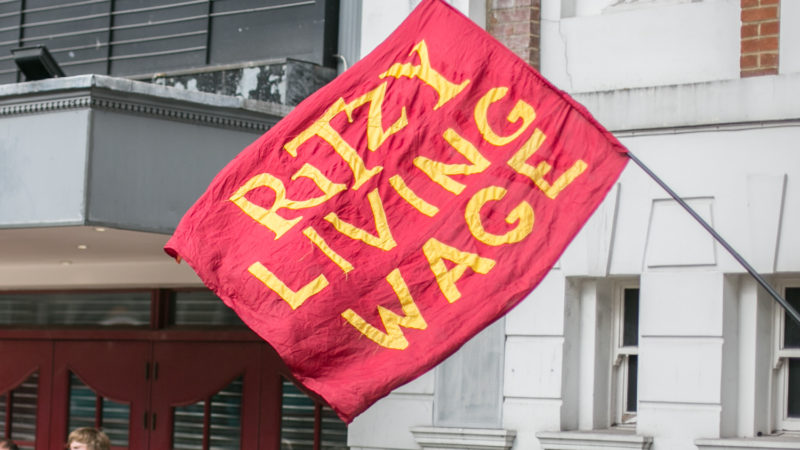It's growing fast: the strikers in Brixton have been joined by workers from Picturehouses in Leicester Square, Hackney, Crouch End, Dulwich and Brighton.

‘Which side are you on’ is the question everyone must answer in a union dispute. Yet when Theresa May was challenged by Labour MP Helen Hayes whether she would support striking Picturehouse workers, she dodged the question at PMQs yesterday.
Choking slightly as she made her response, the PM fudged it: “It’s about a relationship between the employers and workers.”
Cinema staff at the Ritzy in Brixton have been striking since last September, demanding to be paid the London Living Wage, to have their union (BECTU) recognised, and for their fired union representative colleagues to be reinstated.
The strike is growing fast: in January the Ritzy strikers were joined by workers from Picturehouses in Brixton, Leicester Square, Hackney, Crouch End, Dulwich and Brighton.
The number of strikers has increased from 40 to over 300 and over ten months they’ve had fifty strike days. We went to Brixton to ask Ritzy strikers why their industrial action is so important. Here are five reasons why you should get behind them:
1. It shines a light on the hypocrisies of the gig economy
Cineworld, the group who own Picturehouse, made £93.8m in post tax profit last year. Their CEO took home £2.5m in pay and bonuses, an increase from £1.2m the year before. ‘We went into negotiations with them a few days ago and they said they were struggling to maintain pay levels because of the impact of our strikes’, says Kelly Rogers, a Picturehouse worker and union rep who was suspended a month ago, said. ‘They were accusing us of being greedy whilst the CEO increased his own wage by over a £1m last year alone.’
2. It shows that precarious, service industry workers can be unionised
Like Deliveroo workers who went on strike last year and cleaners at LSE who picketed in the spring, the PictureHouse strikes show that workers in traditionally un-unionised industries can take collective action for better working conditions.
“There’s this myth in the trade union movement”, says striking Ritzy worker Kelly Rogers, “that low paid workers, migrant workers, precarious workers, workers on zero-hour contracts, all of whom make up Picture House staff, are impossible to organise. Picture House has shown that that’s not the case. We’ve been unionised for about a decade.
“Here at the Ritzy we have about 80-90 per cent union membership. We recently got five other cinemas out on strike. We’ve multiplied our membership from 40 to about 300. In some of those examples, we’ve recruited almost the entire body of staff in a matter of weeks and got them out on strike.
“There’s an appetite for striking amongst, as I said, precarious, low paid and migrant workers. We’re currently having meetings with workers in Bath, in Oxford and in Cambridge. Hopefully we can make it even bigger.”
3. It shows that precarious, service industry workers, who have been unionised, can win
Ritzy staff originally went on strike in July 2014 for a wage increase, two months later, in September, they won a 26 per cent pay increase from the cinema’s management. “We can do this again”, Kelly said.
4. It proves new, creative, tactics are necessary to win strikes
The strikers have been holding public protests outside the cinemas on strike days, spreading awareness in local communities about their working conditions; and generally challenging Picturehouse’s community-focused brand.
They’ve also called a boycott of all Picturehouse cinemas; they organised a public letter signed by 25 actors and screenwriters including Sir Ian McKellen, Sir Patrick Stewart, Susan Sarandon, Richard Curtis and Ken Loach calling for the public to avoid the cinema.
5. It shows the grievances of precarious workers must now be taken seriously by the political mainstream
“The Labour party will give all the support we can to this strike”, John McDonnell told the assembled picket outside the Ritzy, “and the Picturehouse will regret the day they ever took on this union”, he continued.
McDonnell’s attendance, along with Helen Hayes, MP for Dulwich and West Norwood, showed that the strikers’ concerns and grievances should be considered increasingly politically relevant. John McDonnell has attended Picturehouse pickets in the past, but Labour’s newfound authority in Westminster will mean the issues of precarity in work, exploitative employers and union victimisation will be discussed more and more.
“We’re going to get that message to every other trade union, we’ll try to get Jeremy to make reference to it, we’ll get the TUC to look at it and then we’ll take it on to the Labour party conference. And they will regret the day they ever took on this union. We’ll be upping the action with all the support we can. Showing the employer that it’s the whole workers’ movement they’re up against,” he told the crowd.
It’s in all our interests to get behind this inspiring campaign of low-paid, young service sector workers. However May fudges it, there’s no middle ground on this one.
Left Foot Forward doesn't have the backing of big business or billionaires. We rely on the kind and generous support of ordinary people like you.
You can support hard-hitting journalism that holds the right to account, provides a forum for debate among progressives, and covers the stories the rest of the media ignore. Donate today.




One Response to “5 reasons you should be following the Picturehouse strike”
Dave Roberts
This is similar to the workers at Glastonbury on zero hours contracts. Total hippy/hipster hypocrisy. I have never been in the one in Hackney, my local, even though I have missed several films I wanted to see.